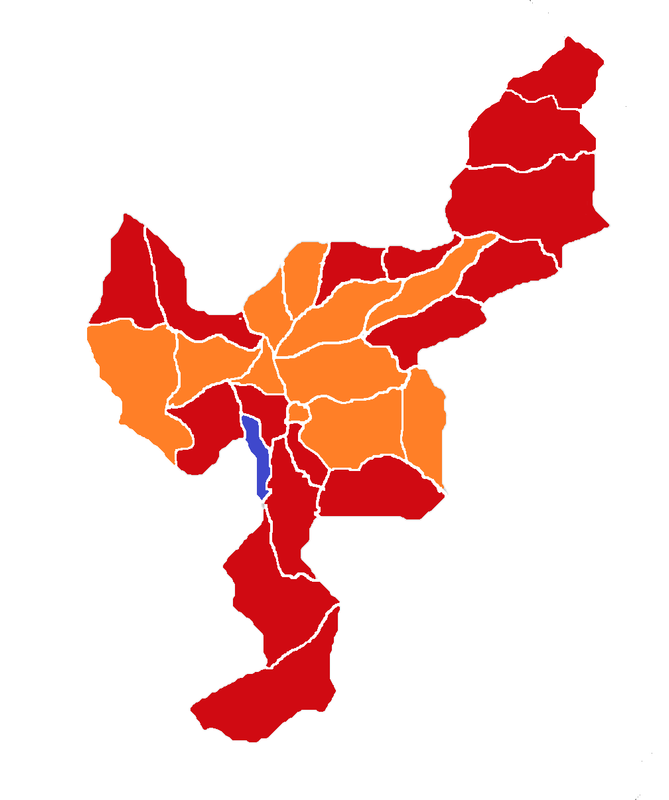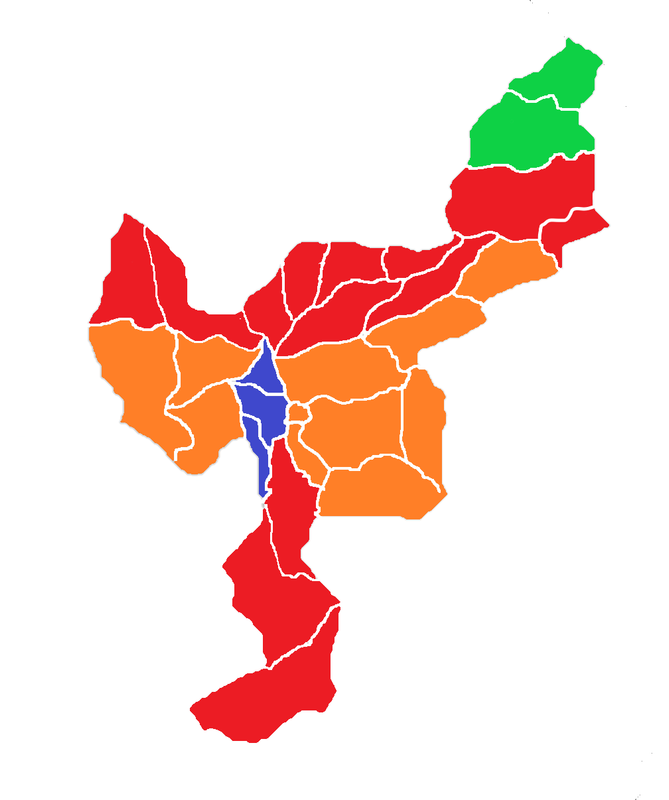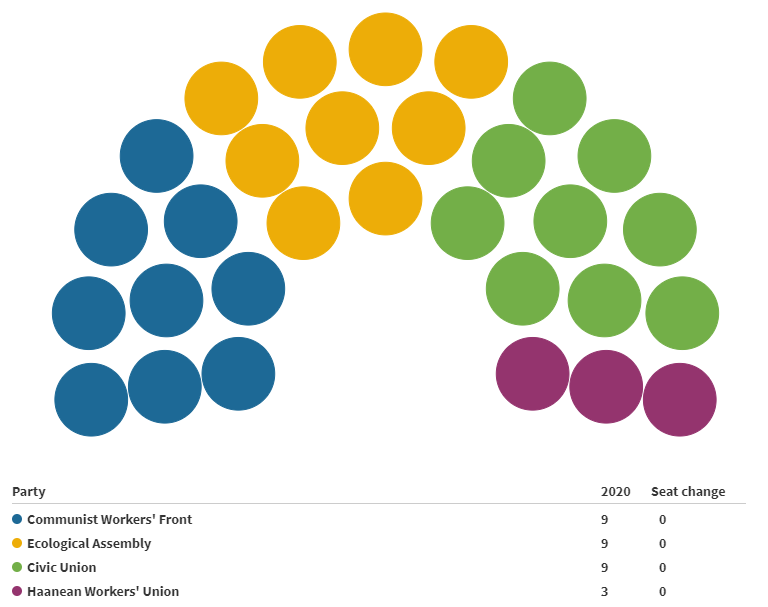2020 Eastern Haanean Elections
-
Becker takes Essen, Ardennes; Bourgaize wins in 'mega-district' Schleswig/Holstein/Meckleberg
In a surprise win, Interim Councillor Becker has won in the Essen district - midsized but thoroughly urban by a margin of six percent. Many are whispering of electoral interference, but such a thing is unlikely.
She has also taken the district of Ardennes; however, as it is rural and sparsely populated, it will have little effect on her prospects.
However, Bourgaize has won in the most populous district of Eastern Haane - Schleswig/Holstein/Meckleberg - overdue for partition as a result of the revolution - by an margin of almost 15 percent.
The current situation is below:

-
Final Results; Bourgaize wins with 18% margin; takes majority of districts
Bourgaize has decisively won the elections to the Councillorship, winning, overall, with results generally corresponding to recent polling. However, previously obscure candidates have also performed well; Marine Marchand, a candidate for the Citizens' Party (a member of the National Front that regularly runs independent candidates for Councillorship elections) won over five percent of the vote, even managing to take the district of Meuse.
The final electoral map is below:

-
Final Results: Percentages
NATIONWIDE
BOURGAIZE: 56,3%
BECKER: 37,9%
MARCHAND: 5,2%
MOST POPULOUS DISTRICTS
SCHLESWIG/HOLSTEIN/MECKLEBERG
BOURGAIZE: 55,4%
BECKER: 40,3%
MARCHAND: 4,1%
NORD
BOURGAIZE: 60,1%
BECKER: 32,2%
MARCHAND: 7,1%
WESTEN
BOURGAIZE: 57,2%
BECKER: 39,6%
MARCHAND: 7,4%
NORTH JUTLAND
BOURGAIZE: 58,1%
MARCHAND: 27,2%
BECKER: 11,5%
-
Politics under the new regime
Although many of us may think we understand the new regime, much about it appears to be misunderstood. With that in mind, we, the united editorial board of Grassroots, endeavor to produce a full explanation.
Representing the state as a whole is the State Elder of the People's Confederation. Whomsoever occupies this role is the face of the nation to the outside world, defining foreign policy and attending inter-national meetings as a representative and having the power to 'veto' bills, although said 'veto' simply begins a series of meetings with whatever chamber of the legislature passed the build, which only end once consensus is reached.
There exists a separate head of government - a Premier - who is advised by a Confederal Council. Whomsoever occupies this role has the responsibility of presiding over meetings of either legislative chamber as well as directing the execution of laws, and is elected by the combined legislative chambers.
The legislative assembly itself has two chambers - the Syndical Assembly and the Assembly of Nations. The Syndical Assembly has (or will have) 30 members, with one for each syndicate/profession (the former guilds). It shall have full power to regulate over everything in the field of the economy, defining professional norms and drafting quarterly economic planning.
The Assembly of Nation will have the same number of members - one per nation - and shall propose legislature on all social matters, including welfare, marriage, and crime.
Delegates to each will be bound to the mandate and demand of their constituents; they cannot act without instructions.
In reality, however, the nations and syndicates will generally propose legislation that affect only themselves in their own assemblies, independent of the confederation, but according to the principles already set out. The situation described above will only occur if greater coordination is necessary, if there is a dispute between nations or syndicates, or if the nations or syndicates themselves declare it necessary by consensus.
The workers' councils will have the authority to send proposals to the syndicates, nations, and their associated legislative bodies; in addition, they have the responsibility of debating legislature, sending complaints and suggestion to the assemblies. They also enforce the laws passed by the various legislative bodies, and own and manage all property.
The Congress of Workers' Councils will act as an ombudsman, overseeing the rest of the government and ensuring that it is for the people. It holds full powers of impeachment.
Elections to any of these bodies may be contested by trade unions, but none else.
The syndicates and nations, as in the past, will be participatory and deliberative, with mass meetings in every municipality where applicable.
-
Elections to the Syndical Assembly, Assembly of Nations, State Eldership
As of now, only four trade unions have entered candidates, with two being directly state-affiliated:
- the Communist Workers' Front (in reality, the workers' councils)
- the Civic Union (in reality, the syndicates)
- the Ecological Assembly
- the Haanean Workers' Union
The Communist Workers' Front's central policy can be summed up as "All power to the councils!" However, they certainly have other points - they wish to abolish money and the class system immediately, if possible. The Civic Union, on the other hand, supports the current status quo, with a gradual transition toward labour vouchers and possibly partial rationing. The Ecological Assembly claims to be post-ideological, supporting only what is good for 'the entirety of the environment of Eastern Haane' - something which it plans to assess through a technocratic but direct-democratic system. The Haanean Workers' Union, most radically, has proposed the abolition of the assemblies, with whatever power the held being delegated to both the State Elder and the syndicates/nations. They claim the family to be the building block of society, on which all other structures must be founded upon but do not believe that said families must be traditional; they also support a form of civic nationalism, in which the various ethnic and linguistic groups are united in the principles of Eastern Haane.
All, however, have professed a form of socialism or communism as their economic policies.
Each has proposed their legislative lists to the syndicates and nations; as they are too numerous, they will not be listed here. However, each has also declared a candidate for the State Eldership, to be shown below:
KATRIN WEBER, of the CIVIC UNION:

MATHILDE COMTOIS, of the COMMUNIST WORKERS' FRONT:
ANNALISE BAUER, of the ECOLOGICAL ASSEMBLY:

MARINE MARCHAND, of the HAANEAN WORKER'S UNION:

-
Final Statements from the Candidates for the State Eldership
WEBER: Eastern Haane is in a time of distress. Destroyed by decades of mismanagement, our country is only a shade of the great power it was in the 1950s and 60s. The revolution has given us a chance to restore ourselves; we have already seen such a thing in the massive growth of the economy since the removal of Hoebeek. The decisions that we make in this time will be of the greatest importance; they will forever leave a mark on our country. We must be careful; we cannot simply give control over the country to hot-heads or to people too cautious to move forward at all. We need a balance - a person strong, a progressive; but one able to see the folly and danger of actions too revolutionary, yet willing to listen and accept the people's opinion. The people running for the State Eldership; almost all of them wish to force a dogma upon you, the people of Eastern Haane. Very few of them will be careful yet progressive, as I have described; even fewer will listen to you at all. Consider what I have said, o people; and look carefully.
COMTOIS: Workers, comrades, now is not the time for tepid reform. It is never the time for tepid reform, for it always ends in disaster. Remember 1996 and the compromise between the people and the oligarchs. Remember how it forced us to revolt once again, how it allowed them to go and run off with what was essentially the entire country's treasury. Around you is the devastation from that; from tepid reform. We learned, for a while, then we fell back into the tepidity. And then came 2013 - the floods, the destruction. The country could not recover fully; go to Rosa-Luxemburg-Stadt to see the collapsed buildings, the remnants of the mudslides. Everything is there. If we go down that lovely path again, who knows what will happen? We must take a bold stance, a revolutionary stance, as they did in 1918, in 1939, in 1980. We must work, not for the appeasement of outside powers, but for ourselves, for the betterment of our own people and for the entirety of mankind.
BAUER: Politics is in itself a disgusting thing. Even the most basic of things can be turned into a shibboleth of partisanship. What often results from this is the degradation of society and the environment . A study showing that x would allow for the happiness of the people? It is an international plot to kill us all! We cannot let such things as this happen, cannot allow for the destruction of everything simply to satisfy politicians who know not a thing about what they are talking about. As much as is possible should be devolved to the experts. Of course, they should not be allowed to rest in their ivory towers. They must be in constant knowledge of the totality of the Haanean environment, at every given time. They must be able to truly know, understand, and respect the natural relationships between all organisms; be the instruments of the true expression of these relationships. All of this will be difficult to achieve; it will require much work on the part of all here. Yet it is the only way to truly create a natural, sustainable, stable world.
MARCHAND: Eastern Haane is falling apart. We have let dogma separate us, have let simple words divide us to the point of violence. If we continue in this way, continue in our hateful rhetoric, we will fall apart, dissolve into nothingness. We must unify ourselves, rather than divide; recognize that we are all equal, all members of a Haanean nation. Our role is not important, in reality; what is is our togetherness, that which binds us together. Certain divisions are inevitable. Yet they can be overcome through a psychological solidarity embedded into the entirety of society - the solidarity of equality, of the nation. This is the basis of an organic socialism, a Haanean socialism - the unity and equality of all people in the nation, in which all work together; none above, none below; for their own benefit.
-
Election Results
All deliberative assemblies across Eastern Haane have concluded deliberation and made an official vote.
Mathilde Comtois was elected State Elder, receiving 32,8% of all votes in the Borda-count styled-election.
District by district results are below:

The Communist Workers' Front is represented by red, the Civic Union is represented by orange, the Ecological Assembly is represented by green, and the Haanean Workers' Union is represented by blue.
By percentage:
COMTOIS: 32, 8%
WEBER: 30,1%
BAUER: 26,5%
MARCHAND: 10,4%
Of the district Presidiums, 10 are controlled by the Communist Workers' Front, 9 by the Civic Union, 6 by the Ecological Assembly, and 4 by the Haanean Workers' Union,
Of the syndical Presidiums, 9 are 'controlled' by the Communist Workers' Front, 9 by the Ecological Assembly, 9 by the Civic Union, and 3 by the Haanean Workers' Union.
The national Presidiums are dominated by the Civic Union, with 11 controlled by it, 10 by the Communist Workers' Front, 7 by the Ecological Assembly, and 2 by the Haanean Workers' Union.
The composition of the Syndical Assembly, as well as the Assembly of Nations, is below:
Syndical Assembly

Assembly of Nations

-
Presidiums of the two Assemblies chosen by sortition, forming a new Confederation Council; Katrin Weber becomes Premier
The five-member Presidiums of the Assembly of Nations and the Assembly of Syndicates were chosen by sortition today. When their respective chambers are not in session, they will hold legislative power.
The two form the Confederation Council, which elects and advises the Premier of the People's Confederation, now Katrin Weber.
-
How do elections work?.
The traditional election has been done away with. People will no longer vote directly but rather through their representatives, as proscribed by the constitution.
It is in this way that the Assembly of the Cantons will be elected.
These strange circumstances create an opportunity for the Haanean electoral system to be explained.
Candidates are nominated by trade unions. They appear at various town halls and debates, which cannot be publicized in most cases as to ensure that individuals truly vote as according to their beliefs.
This is also the explanation for why polls cannot be released; it was decided that they too could influence a person's vote.
Despite this, a candidate's beliefs do not really matter, unless if they are selected by sortition to be a part of a Presidium, for they are bound by mandates given by the people. However, they must 'report' to their constituencies - a tool that can be used to sway a population one way or another.
Elections occur through 10-20 person deliberative assemblies. A week before, each citizen receives a packet containing information on all candidates. In deliberative assemblies, they use the information gained to discuss the best candidate for the constituency.
Voting occurs in the following manner:
- voting begins at 8:00.
- if the assembly reaches consensus by 15:00, that consensus forms its vote, which is transmitted electronically to the office of the nearest workers' council, which then transmits it to the district presidium, which in turn sends it to the cantonal presidium.
- if the assembly cannot reach consensus by 15:00, then only a supermajority (75%) is needed to officialize a vote.
- if the assembly cannot reach a supermajority by 18:00, then a majority is needed to officialize a vote.
- if the assembly does not transmit its vote by 20:00, then it is decided for them using a system of chance, verified by a People's Court.
Voting results are released as soon as all assemblies have transmitted their votes.
When a vote is held in a legislative assembly, the following occurs:
- the agenda is released 3 days before the meeting.
- workers's/national/cantonal councils formulate, based on the mandate of their constituents, a decision and an opinion on the issues on the agenda.
- this decision and opinion is then voted on by all constituents by secret ballot.
- if it passes, it is sent to the next highest council; if not, another is made.
- if no opinion passes by the end of the 3 days, then the representative is allowed to act on their own accord
- if not, then the representative must convey everything written in the mandate, voting according to it.
- deliberation in the assembly continues until a supermajority can be formed.
- with the end of each day of deliberation in the assembly, the representative writes a report to send to their constituents.
- if the constituents change their mind, then another opinion is sent.
-
ELECTION RESULTS
TO THE ASSEMBLY OF CANTONS:
CANTON OF SKAGEN: ECOLOGICAL ASSEMBLY
CANTON OF KOLDING: ECOLOGICAL ASSEMBLY
CANTON OF KIEL: COMMUNIST WORKERS' FRONT
CANTON OF BREMEN: GENERAL UNION OF WORKERS
CANTON OF HAMBURG: GENERAL UNION OF WORKERS
CANTON OF ARNSBERG: CIVIC UNION
CANTON OF AACHEN: UNION OF GUILDS
CANTON OF ROSA-LUXEMBURG: COMMUNIST WORKERS" FRONT
CANTON OF HANNOVER: CIVIC UNION
CANTON OF MUENSTER: HAANEAN WORKERS' UNION
CANTON OF ROSTOCK: COMMUNIST WORKERS' FRONT
CANTON OF CALAIS: GENERAL UNION OF WORKERS
CANTON OF LILLE: GENERAL UNION OF WORKERS
CANTON OF NAMUR: GENERAL UNION OF WORKERS
CANTON OF LAON: UNION OF GUILDS
CANTON OF AMIENS: UNION OF GUILDS
CANTON OF MEZIERES: UNION OF GUILDS
CANTON OF REIMS: CIVIC UNION
CANTON OF BAR: UNION OF GUILDS
CANTON OF METZ: GENERAL UNION OF WORKERS
CANTON OF NANCY: GENERAL UNION OF WORKERS
CANTON OF STRASBOURG: GENERAL UNION OF WORKERS
CANTON OF MULHOUSE: GENERAL UNION OF WORKERS
CANTON OF BEAUVAIS: UNION OF GUILDS
CANTON OF ANTWERP: UNION OF GUILDS
CANTON OF EINDHOVEN/ARNHEIM: CIVIC UNION
CANTON OF ROTTERDAM/THE HAGUE: COMMUNIST WORKERS' FRONT
CANTON OF GRONINGEN/AMSTERDAM: COMMUNIST WORKERS' FRONT
CANTON OF LUXEMBOURG: HAANEAN WORKERS' UNIONON THE REFERENDUMS
-
SHOULD COMMUNISM BE ENSHRINED IN THE CONSTITUTION AS THE FINAL GOAL OF THE PEOPLE'S CONFEDERATION: Y-49,9%, N-50,1%
-
SHOULD THE POSITIONS OF PREMIER AND STATE ELDER BE ABOLISHED: Y-49,99%, N-50,01%
-
SHOULD THE PEOPLE'S CONFEDERATION BE REORGANIZED BASED UPON THE CURRENTLY EXISTING WORKERS' COUNCILS: Y-48,2%, N-51.8%
-
SHOULD WORKERS' COUNCILS INDEPENDENT OF THE SYNDICATES, NATIONS, AND/OR CANTONS BE ABOLISHED: Y-49,7%, N-50,3%
-
SHOULD ALL MASS ORGANIIZATIONS BE ALLOWED TO NOMINATE CANDIDATES IN ELECTIONS: Y-22,3%, N-77,7%
-
SHOULD ONLY COMMUNITIES BE ALLOWED TO NOMINATE CANDIDATES IN ELECTIONS: Y-49,6%, N-50,4%
-
SHOULD A PLURALIST POLITICAL SYSTEM BE REINSTATED: Y-11,7%, N-88,3%
-
SHOULD REPRESENTATIVES BE TRUSTEES RATHER THAN DELEGATES: Y-9,2%, N-90,8%
-
SHOULD EASTERN HAANE RECOGNIZE THE UNSR AS THE RIGHTFUL GOVERNMENT OF ICHOLASEN: Y-49,999%, N-50,001%
-
SHOULD EASTERN HAANE BE RENAMED 'HAANE?': Y-7,1%, N-92,9%
-
SHOULD EASTERN HAANE REMAIN A MEMBER OF THE EUROPEAN UNION: Y-72,9%, N-27,1%
-
-
Referendum Results
On the adoption of the new constitution:
59,2% in favor.
41,8% against.On the decision to stay with the status quo:
All cantons in favor; avg. of 54,2% in favor.